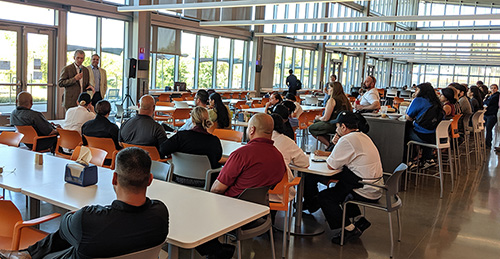
UC Merced leadership met with more than 50 university staff members this month to discuss organizational changes to housing, dining and other auxiliary services on campus.
The goal is to improve customer satisfaction and loyalty, while also protecting and supporting student life and residence education.
The restructuring of auxiliary organizations builds on a strategic partnership between the Division of Student Affairs and the Department of Auxiliary Enterprises and Fiscal Innovation (AFI), which is housed in the Division of Finance and Administration. AFI includes Dining Services, the Campus Store, Housing Operations, the Conference Center, Transportation and Parking Services, and the Early Childhood Education Center.
Vice Chancellor for Student Affairs Charles Nies and Interim Vice Chancellor and Chief Financial Officer Michael Riley provided updates and answered questions from those in attendance.
Nies said the joining of Student Affairs with auxiliary services will improve student experiences and outcomes, with student success and retention research helping to inform decisions that will be in the best interest of the students. This restructuring comes weeks before a new housing requirement will debut that mandates students live on campus for their first two years. Research shows living on campus greatly improves student retention and graduation rates.

“We are doing some really innovative and groundbreaking initiatives to support student success, and the student experience includes where they live, how they feel and the meals they’re eating,” Nies said. “The work you all do helps students feel like they matter, like they belong, like they can succeed here.”
In the new structure, the directors of Housing, Dining, the Campus Store and the Conference Center will report to Alan Coker, associate vice chancellor for AFI. A new position, residence life director, will take charge of responsibilities related to residence life and residence education. This director will report to Martin Reed, who moves into the role of assistant vice chancellor for Student Life and Residence Education. Reed will oversee major initiatives related to student life, including global food initiatives, sustainability programs, and programs for parents and families.
Riley mentioned the university’s ongoing efforts to modernize systems and processes to make it easier for people to do their jobs, and he said staff will be reaching out to students directly and through surveys to find out what’s working and what isn’t. Success will require collaborative and collective work in both operations and programming, and a consistent commitment to staff engagement and the student experience.
“We need to make sure our operations are financially sustainable, while still being able to address things like food insecurity, staff development and student success,” Riley said.






